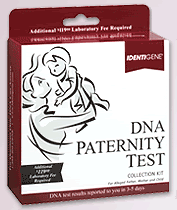 Some people say it's the democratization of DNA. Others are seeing dollar signs in the double helix. And some states, like New York, the option isn't even there. But in most states, you can now pick up a DNA test for a few bucks that will answer the question: are you my daddy? The paternity test by Identigene cost around $30 in store - with another $120 in lab processing fees. But it guarantees to answer, with a 99% accuracy, whether or not someone is the father of the child in question.
Some people say it's the democratization of DNA. Others are seeing dollar signs in the double helix. And some states, like New York, the option isn't even there. But in most states, you can now pick up a DNA test for a few bucks that will answer the question: are you my daddy? The paternity test by Identigene cost around $30 in store - with another $120 in lab processing fees. But it guarantees to answer, with a 99% accuracy, whether or not someone is the father of the child in question. It's not a legal kit, it won't hold up in court - those are also available over the counter (or at least, over the internet), and cost quite a bit more money. But people are suggesting that the use here is not necessarily to prove paternity in a court case, but to try to prevent a case from going that far to begin with. A sort of pre-court negotiation tactic, I suppose. But I wonder how effective that's really going to be? I know more than one couple with an acrimonious split where, if this kit were used to prove paternity, the retort would just be that the woman was using the DNA of the "real" father, and not the man in question; it would just feed fires rather than calm them. Perhaps calmer heads to prevail...
I just don't see this offering the peace of mind it's being advertised to offer. If there's that level of suspicion and mistrust already, is a test going to help? I suppose it might, so long as it answers the affirmative - that the child is his son. But what does it do to trust in a relationship? What are the social implications? And what does it say that Identigene is offering the kits so inexpensively because of the anticipated volume of sales?
Maybe most importantly, what happens when a test result comes in, and it's not the result you want (either way)? There's no one around to talk to, or help you work through possible conflicting emotions (or anger). There's not necessarily a cooler head to prevail, and to get one, you're probably going to have to spend the money over again, to have an actual legal and verifiably untampered sample taken and tested. Which just means spending more money in the long run.
The more I think about it, the more this seems like it's taking advantage of people's fears without any sort of positive payoff for the person involved - but it's also early Monday morning, I haven't had coffee, and I am admittedly cranky. Does anyone else have another/different take on this? Can you see a positive here that I am missing?
-Kelly
Sadly, no.... I think this is just another example of companies taking advantage of genetic hype to offer products of dubious value to an underinformed public. What's different about this one from others is that it's not at all health related.
ReplyDelete